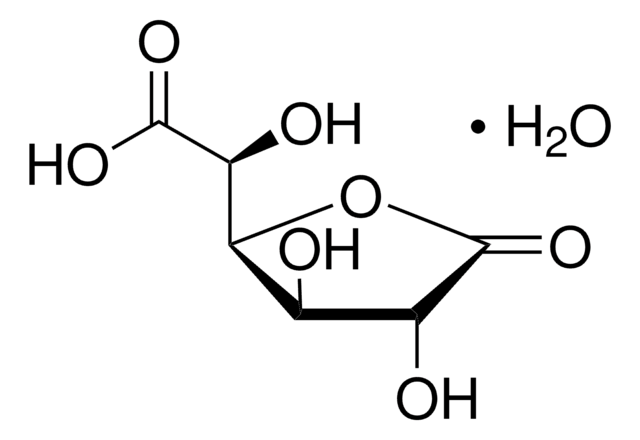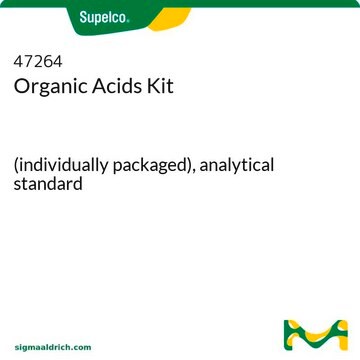347420
β-Glucuronidase, Helix pomatia
Native β-glucuronidase from Helix pomatia. Useful for hydrolyzing urinary steroid conjugates prior to steriod assays. Note: 1 MU = 1,000,000 units.
Se connecterpour consulter vos tarifs contractuels et ceux de votre entreprise/organisme
About This Item
Produits recommandés
Source biologique
Helix pomatia
Niveau de qualité
Forme
liquid
Fabricant/nom de marque
Calbiochem®
Conditions de stockage
do not freeze
Solubilité
aqueous buffer: soluble
Activité étrangère
Aryl sulfatase ≤2%
Conditions d'expédition
wet ice
Température de stockage
2-8°C
Catégories apparentées
Description générale
Native β-glucuronidase from Helix pomatia. Useful for hydrolyzing urinary steroid conjugates prior to steriod assays. Note: 1 MU = 1,000,000 units.
Native β-glucuronidase from Helix pomatia. Useful for hydrolyzing urinary steroid conjugates prior to steriod assays. Note: 1 MU = 1,000,000 units.
Actions biochimiques/physiologiques
β-Glucuronidase, a member of the 2 glycosyl hydrolase family, is involved in the hydrolysis of β-glucuronic acid residues from the non-reducing termini of glycosaminoglycans (GAGs). β-Glucuronidase catalyzes the complete hydrolysis of urinary conjugates. β-Glucuronidase serves as a possible candidate enzyme for gene-mediated enzyme prodrug therapy for glucuronide prodrugs. β-glucuronidase-responsive albumin binding prodrugs might be an effective therapeutic practice for treating solid tumors.
Avertissement
Toxicity: Standard Handling (A)
Définition de l'unité
One unit is defined as the amount of enzyme that will liberate 1.0 µg phenolphthalein from phenolphthalein glucuronide per h at 37°C, pH 5.0.
Forme physique
A 65% saturated ammonium sulfate suspension.
Reconstitution
Following reconstitution, store in refrigerator (4°C). Stock solutions are stable for up to 3 months at 4°C.
Autres remarques
Shibasaki, H., et al. 2001. Steroids66, 795.
Graef, V., et al. 1977. Clin. Chem.23, 532.
Graef, V., et al. 1977. Clin. Chem.23, 532.
Informations légales
CALBIOCHEM is a registered trademark of Merck KGaA, Darmstadt, Germany
Mention d'avertissement
Danger
Mentions de danger
Conseils de prudence
Classification des risques
Resp. Sens. 1 - Skin Sens. 1
Code de la classe de stockage
12 - Non Combustible Liquids
Classe de danger pour l'eau (WGK)
WGK 3
Certificats d'analyse (COA)
Recherchez un Certificats d'analyse (COA) en saisissant le numéro de lot du produit. Les numéros de lot figurent sur l'étiquette du produit après les mots "Lot" ou "Batch".
Déjà en possession de ce produit ?
Retrouvez la documentation relative aux produits que vous avez récemment achetés dans la Bibliothèque de documents.
Prabha Dwivedi et al.
Chemosphere, 199, 256-262 (2018-02-16)
Human exposure to consumer and personal care products chemicals such as phenols, including parabens and other antimicrobial agents, can be assessed through biomonitoring by quantifying urinary concentrations of the parent chemical or its metabolites, often after hydrolysis of phase II
Isabelle Tranoy-Opalinski et al.
European journal of medicinal chemistry, 74, 302-313 (2014-02-01)
The design of novel antitumor agents allowing the destruction of malignant cells while sparing healthy tissues is one of the major challenges in medicinal chemistry. In this context, the use of non-toxic prodrugs programmed to be selectively activated by beta-glucuronidase
K-C Chen et al.
Cancer gene therapy, 14(2), 187-200 (2006-09-16)
Gene-mediated enzyme prodrug therapy (GDEPT) seeks to increase the therapeutic index of anti-neoplastic agents by promoting selective activation of relatively nontoxic drug derivatives at sites of specific enzyme expression. Glucuronide prodrugs are attractive for GDEPT due to their low toxicity
Loganathan Arul et al.
Bioinformation, 2(8), 339-343 (2008-08-08)
Glycosyl hydrolases hydrolyze the glycosidic bond either in carbohydrates or between carbohydrate and non-carbohydrate moiety. The beta-glucuronidase (beta D-glucuronoside glucuronosohydrolase; EC 3.2.1.31) enzyme belongs to the family-2 glycosyl hydrolase. The E. coli borne beta-glucuronidase gene (uidA) was devised as a
Notre équipe de scientifiques dispose d'une expérience dans tous les secteurs de la recherche, notamment en sciences de la vie, science des matériaux, synthèse chimique, chromatographie, analyse et dans de nombreux autres domaines..
Contacter notre Service technique






